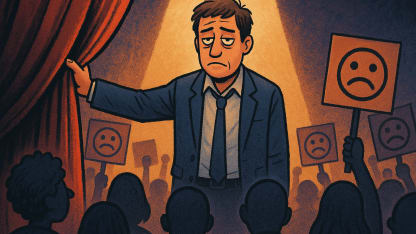AudioSource Outdoor Rock Speaker Pair



Our Take
- Speakers that look just like fake rocks- 100 watts per channel of neighbor-annoying power- Use the speakers together, for stereo sound, or as two separate mono speakers for your AM radio jams- Weather resistant but you still might want to bring them in during the next hundred-year flood- Model: RK5G
Write down our alley.
Let’s say you just manufactured $100 million worth of a miraculous new imitation horse manure. Then it turns out that people prefer the real thing. Forget turning a profit - you can’t even sell it for enough to make your money back. It’s time for a write-down.What that means is, everybody at your company will get together and decide to “write down” the value of that horse manure to something more like the actual value (in other words, what someone will pay for it). Let’s say that’s $30 million. Now you have a clearer picture of your actual assets on hand, and can get rid of it at a more realistic wholesale price. This write-down puts a $70 million business expense on the books at the stroke of a pen (or keyboard), which can have an uncomfortable effect on your shareholders but a nice consolation effect on your tax bill. You might remember the news about Amazon writing down their Fire phones, when they realized they had made a pile of fake horseshit nobody wanted.Which brings us to today. Take these AudioSource Outdoor Rock Speakers (please). See, writing down is usually something manufacturers do, not retailers. Even Amazon was acting as the manufacturer of the the Fire phones, not just the seller. Writing down is the last resort of the “market maker” is, which is almost always whoever makes the stuff being written down. Retailers can return unsold product or demand refunds from wholesalers; wholesalers can do the same to manufacturers; manufacturers have nobody to pass the buck to but themselves.But we’re weird, for retailers. We basically “adopt” entire products, buying up all or nearly all of the available inventory. We pay cash up front, we don’t negotate any return rights, we promise to take the product away so the manufacturer never has to think about it again. That’s how we’re able to negotiate better prices than billion-dollar retail giants: because we assume all the risk. When AudioSource sold us these, we had to take their headache, too, no give-backs. Now we “make the market” for the AudioSource Outdoor Rock Speakers. Alas, that market has sucked. We haven’t been able to make any money selling these for a profit. According to our actual per-item cost, there was no way we could set the price as low as you see it today. We’d be losing money. So our people sat around a table and agreed to have collective amnesia about what price we really paid for this thing. Once we’ve written down some of that cost, wow! Suddenly we’ve got all kinds of room to sell them for much less and still make a “profit”!Yeah, it’s a little bit of a shell game. Writing down just means we “lose” the money all at once instead of losing a little bit with each item we sell below cost. But again, that’s kind of the point: it re-introduces the incentive to sell these instead of letting them sit there, where at least they could theoretically be holding their value. It resets expectations, so we can judge the success of the sale more realistically. It acknowledges the reality that nobody wants these things at the old price. And that leads to the obvious implication: if consumers all agreed amongst themselves not to buy something until the price came down, the price would come down. Want an Apple Watch for fifty bucks? It’s literally effortless! Customers, unite and do nothing! Rise up and sit back down again! Let’s just all decide the Apple Watch sucks and not buy it! It worked perfectly with the Fire Phone, right?








![['THON] Romantic Gestures That Barely Counted](https://d2b8wt72ktn9a2.cloudfront.net/mediocre/image/upload/c_thumb,dpr_2.0,f_auto,h_117,q_auto,w_208/ym4zxxn4gcccfppll7vj.webp)

